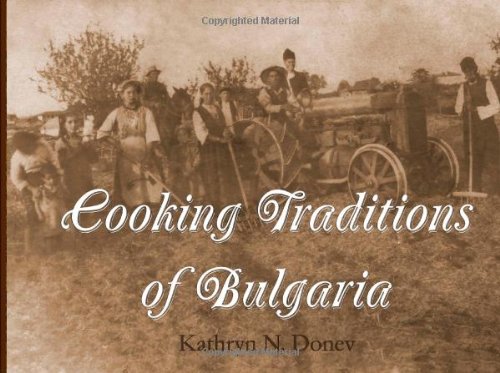The Unrealized Spiritual Harvest of Bulgarian Churches in North America
 ….A closer examination of the ministry and structure of the network of Bulgarian churches in North America will give answers to essential issues of cross-cultural evangelism and ministry for the Church of God. Unfortunately, until now very little has proven effective in exploring, pursuing and implementing cross-cultural paradigms within the ministry opportunities in communities formed by immigrants from post-Communist countries. As a result, these communities have remained untouched by the eldership and resources available within the Church of God denomination. There are presently no leaders trained by the Church of God for the needs of these migrant communities. Thus, a great urban harvest in large metropolises, where the Church of God has not been historically present in a strong way, remains ungathered. Although, through these communities, the Church of God has the unique opportunity to experience the post-Communist revival from Eastern Europe in a local Western setting… (p.84, Chapter III: Contextual Assessment, Historical Background, Structural Analyses and Demographics of Immigration in a Paradigm for Cross-Cultural Ministries among Migrant and Disfranchised Ethnic Groups in America Today) Read complete paper (PDF)
….A closer examination of the ministry and structure of the network of Bulgarian churches in North America will give answers to essential issues of cross-cultural evangelism and ministry for the Church of God. Unfortunately, until now very little has proven effective in exploring, pursuing and implementing cross-cultural paradigms within the ministry opportunities in communities formed by immigrants from post-Communist countries. As a result, these communities have remained untouched by the eldership and resources available within the Church of God denomination. There are presently no leaders trained by the Church of God for the needs of these migrant communities. Thus, a great urban harvest in large metropolises, where the Church of God has not been historically present in a strong way, remains ungathered. Although, through these communities, the Church of God has the unique opportunity to experience the post-Communist revival from Eastern Europe in a local Western setting… (p.84, Chapter III: Contextual Assessment, Historical Background, Structural Analyses and Demographics of Immigration in a Paradigm for Cross-Cultural Ministries among Migrant and Disfranchised Ethnic Groups in America Today) Read complete paper (PDF)
How to Start a Bulgarian Church in America from A-to-Z
Featured Author of the Month Evdokia Krusteva Shares Ancient Recipes of Bulgaria
BulgarianCooking.com’s featured author of the month is Bulgarian native, Evdokia Krusteva who wrote the cookbook, “Ancient Recipes of Bulgaria“.
Evdokia (Eva) Krusteva was born and raised in Yambol, Bulgaria. She is a fourth generation Pentecostal believer and minister of the gospel. She fondly remembers how her home was opened to holding services underground during communist times. These times would be centered around a meal as not to bring unwanted attention to people gathering.
Having lived in communist and post-communist Bulgaria, Eva has a unique view on life with a great story to tell. She often recalls how dishes were traditionally prepared growing up along with the many unique customs of each. She has included a few in this collection of memories.
 This cookbook features nearly two dozen truly ancient recipes of Bulgarian cooking. Some of these dishes are distant relatives to ones found in ancient Roman manuscripts believed to have been compiled in the late 4th or early 5th century AD. Others are among those far before the time of Christ. As Bulgaria is a country of oral history, recipes are typically not written, but passed down from one generation to the next by experiencing the method of preparation. With nearly every dish in Bulgarian cooking comes a story and custom. This cookbook attempts to preserve these hundred year old stories for many years to come so they can continue to be passed down.
This cookbook features nearly two dozen truly ancient recipes of Bulgarian cooking. Some of these dishes are distant relatives to ones found in ancient Roman manuscripts believed to have been compiled in the late 4th or early 5th century AD. Others are among those far before the time of Christ. As Bulgaria is a country of oral history, recipes are typically not written, but passed down from one generation to the next by experiencing the method of preparation. With nearly every dish in Bulgarian cooking comes a story and custom. This cookbook attempts to preserve these hundred year old stories for many years to come so they can continue to be passed down.
Bulgarian Cookbooks Available Worldwide in Germany, Japan, France, United Kingdom, United States, Canada, Spain, Mexico on AMAZON.com
Amazon has marketplaces worldwide and offers all Bulgarian Cooking Cookbooks for purchase with the simple click of a button.
To purchase in Germany (Jetzt Kaufen): https://www.amazon.de
To purchase in UK: https://www.amazon.co.uk
To purchase in Spain (Comprar Ahora): https://www.amazon.es
To purchase in Japan: https://www.amazon.co.jp
To purchase in France (Achetez-le Maintenant): https://www.amazon.fr
To purchase in Canada: https://www.amazon.ca
To purchase in Mexico (Comprar Ahora): https://www.amazon.com.mx
Cooking Traditions of Bulgaria, First Edition is NOW on SALE in Limited Print
This cookbook features authentic recipes in attempts to further the tradition of keeping alive century old recipes of Bulgarian cuisine. Here you can learn how to make dishes from moussaka to baklava and others in between. The variety of tastes of authentic Bulgarian foods is much desired and the chosen recipes are easy to follow.

Go to amazon to see the table of contents and purchase
or purchase directly form CreatSpace eStore here: https://www.createspace.com/3890623
FIRST EDITION, 2012
Copyright © February, 2012 by Dony & Kathryn Donev
Cooking Traditions of Bulgaria
© 2012, Spasen Publishers, a division of www.cupandcross.com
ALL RIGHTS RESERVED under international and Pan-American Copyright Convention. Printed in the United States. This book contains material protected under International and Federal Copyright Laws and Treaties. Any unauthorized reprint or use of this material is prohibited. No part of this book may be reproduced or transmitted in any form or by any means, electronic or mechanical, including photocopying, recording, or by any information storage and retrieval system without express written permission from the author(s)/publisher.
ALL BOOKS CHRISTMAS SALE
In the past five years since 2011, we have authored over two dozen books related to our ministry and mission work in Eastern Europe. As several of the prints are now almost exhausted and second/third editions and several new titles are under way, we are releasing all currently available editions in a Christmas sale through the month of December. All titles are available at up to 30% off and Amazon offers free shipping and extra savings for bundle purchases.
Christmas Book Sale: Psychological Exploration of Communist and Post Communist Bulgaria
In the past five years since 2011, we have authored over two dozen books related to our ministry and mission work in Eastern Europe. As several of the prints are now almost exhausted and second/third editions and several new titles are under way, we are releasing all currently available editions in a Christmas sale through the month of December. All titles are available at up to 30% off and Amazon offers free shipping and extra savings for bundle purchases.
Our book available on sale today is:
Psychological Exploration of Communist and Post Communist Bulgaria
Silence in the face of evil is itself evil: God will not hold us guiltless.
Not to speak is to speak. Not to act is to act.
~Dietrich Bonhoeffer
 Surrounded with insecurity and uncertainty, the Bulgarian Evangelical believer finds great hope and comfort in the fact that God holds the future in His hands. Christianity is a reality that is certain. While having lived in a culture of oppression and persecution, the Bulgarian Evangelical believer now can trade a downtrodden spirit for one of triumph. The once atmosphere of turmoil is being transformed to one of liberation in the Spirit where chains of slavery are traded for a crown of joyous freedom. Living in the 21st century in a context of post communist and postmodern transformations, Bulgarian Evangelical believers must remain true to their historical heritage and preserve their identity in order to keep their faith alive. This unique testimony must be passed on to future Bulgarian generations by telling the story of the true Pentecostal experience.
Surrounded with insecurity and uncertainty, the Bulgarian Evangelical believer finds great hope and comfort in the fact that God holds the future in His hands. Christianity is a reality that is certain. While having lived in a culture of oppression and persecution, the Bulgarian Evangelical believer now can trade a downtrodden spirit for one of triumph. The once atmosphere of turmoil is being transformed to one of liberation in the Spirit where chains of slavery are traded for a crown of joyous freedom. Living in the 21st century in a context of post communist and postmodern transformations, Bulgarian Evangelical believers must remain true to their historical heritage and preserve their identity in order to keep their faith alive. This unique testimony must be passed on to future Bulgarian generations by telling the story of the true Pentecostal experience.
Obama, Marxism and Pentecostal Identity
Time and time again in the past several years, while ministering in churches across the United States, friends and partners ask us about our opinion on the political situation at home and around the world. Many of them ask the direct question of America becoming more and more socialist-like. Our response is that while people have the right to own a business, there cannot be communism, but this barely scratches the surface.
“Looking over the Wall” answers this and many other important questions about the current global reality from a very distinct Pentecostal and the same time post communist point of view. Yet, the text does it in a way, which can actually relate to popular American culture and current economic reality. The book provides Christian answers as of what defines our identity and makes us human – a right communism strips from the persona, the family and the church without much regard of the consequences that follow.
But this drastic dehumanization has an almost irreversible effect on the human psyche – a slavery mentality that penetrates the very heart of men and women and leaves forever its mark of fear, depression and insecurity. The book traces how Pentecostalism as faith and ideology has the power to deliver post communist communities from the grasp of oppressive governments and transform them into a socially relevant culture changing force. At the same time, it remains a warning to theologians who dare to flirt with Marxist idealism being fulfilled in the context of the New Testament ecclesia. And rightfully so!
The book is a must read for any and all who are ministering or planning to minister in a post communist culture or among post communist groups regardless of their geographical locale. For the principles it shows are valid for post community mentality everywhere. Preview and purchase your copy directly at Amazon.com
Christmas Book Sale: The CASE of a NATO CHAPLAINCY MODEL within the BULGARIAN ARMY
In the past five years since 2011, we have authored over two dozen books related to our ministry and mission work in Eastern Europe. As several of the prints are now almost exhausted and second/third editions and several new titles are under way, we are releasing all currently available editions in a Christmas sale through the month of December. All titles are available at up to 30% off and Amazon offers free shipping and extra savings for bundle purchases.
Our book available on sale today is:
THE CASE OF A NATO CHAPLAINCY MODEL WITHIN THE BULGARIAN ARMY (Submitted to the Manfred Wörner Foundation)
 In April 2004, Bulgaria was officially accepted into the global structure of the North Atlantic Treaty Organization (NATO). The event followed a long series of historic developments that were accomplished despite the existence of highly antagonistic forces that opposed the very idea of Bulgaria’s membership in any Western alliance. Among these were internal and external political, economical and social factors that historically have forced the country to remain under the influence of the forces opposing the West.
In April 2004, Bulgaria was officially accepted into the global structure of the North Atlantic Treaty Organization (NATO). The event followed a long series of historic developments that were accomplished despite the existence of highly antagonistic forces that opposed the very idea of Bulgaria’s membership in any Western alliance. Among these were internal and external political, economical and social factors that historically have forced the country to remain under the influence of the forces opposing the West.
As the country of Bulgaria is now a member of NATO and awaits acceptance into the European Union in 2007, international experts are working with various government institutions and consultant agencies to create an atmosphere in which the Bulgarian mindset can experience a new national revival in the 21st century. NATO’s involvement in this process serves as a catalyst both for reinforcing Bulgaria’s infrastructure and attracting international interest in the country’s affairs. Issues concerning national security, military involvement, international relations, economical development and ethnic diversity are continuously and carefully taken into consideration. However, one issue still remains untouched neither by NATO’s official position in Bulgaria, nor by the Bulgarian government. This is the issue of faith.
Three reasons make such topic of relevant importance. First, Bulgaria claims traditional and historical religious belongingness to the Eastern Orthodox Church. Furthermore, the centuries of religious wars on the Balkans have formed a complete dependency on ethnic religiosity, making faith the prime factor for animosity, hatred and genocide. Finally, the issue of morale and morality in the armed forces remains open for any military unit and will need to be addressed sooner or later in the context of NATO’s presence in Bulgaria.
This research will show how the above issues could be resolved by the presence of a NATO paradigm for chaplaincy within the Bulgarian Armed Forces. The paper will explore the current developments of chaplaincy in Bulgaria on three levels: church, society and government. It will then present the case of “underground chaplaincy” in Bulgaria and provide an appropriate solution to be implemented through the newly established Bulgarian Chaplaincy Association. The conclusion will outline the benefits that can be achieved by a partnership between local NATO representatives and the Bulgarian Chaplaincy Association who combine efforts to restore the spirituality within the Bulgarian Army through the legalization of chaplaincy ministry within its structures.
Also important [click to read]:
- U.S. Department of State recognizes our chaplaincy efforts in Bulgaria
- Bulgarian Chaplaincy Association: Integration Proposal with Local NATO Programs
- Bulgarian Chaplaincy Association: Vision and Resolution
- Chronology of our role and involvement in developing Church of God chaplaincy in Bulgaria since 2001
- Master’s of Chaplaincy Ministry Program in Bulgaria Reflections
- The Past Decade of Chaplaincy in Bulgaria (2006-2016)
- Related Publications and Presentations by Cup & Cross Ministries International
Chronology of our role and involvement in developing Church of God chaplaincy in Bulgaria since 2001
History of Events
05/12 Anticipated Date for Graduation of the First Cohort of Master’s Program of Chaplaincy Ministry in Bulgaria
2011
09/11 – Master’s of Chaplaincy Ministry Program Module 3: Counceling Completed
07/11 – Master’s of Chaplaincy Ministry Program Module 2: Theology Completed
03/11 – Master’s of Chaplaincy Ministry Program approved by the Educational Committee of the Bulgarian Evangelical Theological Institute
01/11 – Master’s of Chaplaincy Ministry Program Continues
2010
10/10 – Master’s of Chaplaincy Ministry Program Module 1: Chaplaincy Completed
09/10 Master’s of Chaplaincy Ministry Program begins in Sofia, Bulgaria
06/10 Chaplaincy Conference and Master’s of Chaplaincy for Bulgaria
01/10 Proposal masters program finalized and submitted for approval to the Educational Committee of the Bulgarian Evangelical Theological Institute
2009
10/09 Bulgarian Chaplaincy Association holds an introductory chaplaincy course in Yambol, Bulgaria
2008
12/08 Family Seminar for Military Men and Women held in Yambol
11/08 Bulgarian Chaplaincy Association Annual Meeting
09/08 – Bulgarian Chaplaincy Associations noted in Church of God publications
06/08 – The Case of a NATO Chaplaincy Model within the Bulgarian Army released
06/08 – Celebrating 10 Years of Military Ministry in Bulgaria
2007
10/07 – Bulgarian Chaplaincy Associations Recognized by U.S. Department of State
07/07 – National Chaplaincy Conference in Yambol, Bulgaria
03/07 – Bulgarian Chaplaincy Association was officially registered
02/07 – Bulgarian Chaplaincy Association gains legal status
01/07 – Bulgarian Chaplaincy Assassination noted by international religious freedom watch dog Forum 18
2006
12/06 – Registration Rejected Bulgarian Chaplaincy Association by Bulgarian court
11/06 – A master program in chaplaincy ministry has been proposed for the Bulgarian Evangelical Theological Institute in Sofia
10/06 – Bulgarian Chaplaincy Association Founder’s Meeting in Sofia, Bulgaria
10/06 – A contextualized course for chaplaincy ministry is offered at the Bulgarian Evangelical Theological Institute in Sofia
08/06 – Bulgarian Chaplaincy Association’s Resolution No. 1 sets course toward chaplaincy in churches, education and government institutions
07/06 – National Chaplaincy Meeting in Yambol, Bulgaria
06/06 – Meeting with NATO Chaplains
05/06 – Cup & Cross Ministries submitted a research paper to NATO’s Manfred Wörner Foundation dealing with the case of underground chaplaincy within the Bulgarian Armed Forces
03/06 – A contextualized course for chaplaincy ministry was offered in Veliko Turnovo
02/06 – www.kapelanstvo.com was released to serve as the official website of the chaplaincy movement in Bulgaria
2005
10/05 – A national training seminar held in Veliko Turnovo
10/05 – The Bulgarian Chaplaincy Association was presented before the Bulgarian Evangelical Alliance
09/05 – Regional meeting in Nova Zagora which addressed the current issues
08/05 – A regional chaplaincy meeting in Sliven
07/05 – Publication of camouflage New Testaments and Bibles, some of which we distributed to Bulgarian army personal including the divisions currently serving in Iraq
2004-2001
- Chaplaincy Conference and Master’s of Chaplaincy
- Chaplaincy Course in Yambol, BULGARIA
- Bulgarian Chaplaincy Association Annual Meeting
- Family Seminar for Military Men and Women
- Cup & Cross Ministries in Church of God Publications
- The Case of a NATO Chaplaincy Model within the Bulgarian Army
- 10 Years of Military Ministry in Bulgaria
- Bulgarian Chaplaincy Associations Recognized by U.S. Department of State
- National Chaplaincy Conference
- Bulgarian Chaplaincy Association Gains Legal Status
- Chaplain Dees Visits Bulgaria
- Chaplaincy Course at the Bulgarian Evangelical Theological Institute
- Bulgarian Chaplaincy Association
- Meeting the NATO Chaplain
- National Chaplaincy Meeting
- Chaplaincy Developments in Bulgaria
- U.S. Bases in Bulgaria
- National Chaplaincy Meeting
- Chaplaincy in Bulgaria
- HEALTHCARE CHAPLAINCY IN BULGARIA
- Chaplaincy in Bulgaria
- Mission Bulgaria
Christmas Book Sale: Pentecostal Primitivism
In the past five years since 2011, we have authored over two dozen books related to our ministry and mission work in Eastern Europe. As several of the prints are now almost exhausted and second/third editions and several new titles are under way, we are releasing all currently available editions in a Christmas sale through the month of December. All titles are available at up to 30% off and Amazon offers free shipping and extra savings for bundle purchases.
Our book available on sale today is:
Prophetic and Persecuted Movement
![51DUWeyraBL._SY344_PJlook-inside-v2,TopRight,1,0_SH20_BO1,204,203,200_[1]](https://cupandcross.com/wp-content/uploads/2014/04/51DUWeyraBL._SY344_PJlook-inside-v2TopRight10_SH20_BO1204203200_1.jpg) Since a social movement that purposes liberation of the individual is always rejected by the present political and economic powers, Pentecostalism arises and develops in the midst of constant persecution and resistance. The constantly present struggle against evil, wrong and unrighteousness is the power that moves Pentecostalism to its final purposes. Once persecution disappears, Pentecostalism loses its original power and turns to a nominal religious organization, which continues to function and exist, however, outside the boundaries of its original purpose.
Since a social movement that purposes liberation of the individual is always rejected by the present political and economic powers, Pentecostalism arises and develops in the midst of constant persecution and resistance. The constantly present struggle against evil, wrong and unrighteousness is the power that moves Pentecostalism to its final purposes. Once persecution disappears, Pentecostalism loses its original power and turns to a nominal religious organization, which continues to function and exist, however, outside the boundaries of its original purpose.
The theology of the Persecuted Church is a theology of martyrdom. The context of persecution is a constantly present formational factor in Pentecostalism worldwide, and as such it is a universal characteristic of the movement. Only as such can Pentecostalism act in its God-given prophetic authority. In the same prophetic power in which John prophesies of the coming Baptiser with the Holy Spirit, the Early Pentecostals preached about the Fire from Heaven prior to the actual experience of the Holy Spirit baptism. The message of the movement then becomes a prophetic utterance under which the movement grows and develops to the point of fulfillment of the promise given by God.
20 more recent Pentecostal articles in light of the upcoming Pentecostal Sunday celebration:
- The Forgotten Azusa Street Mission: The Place where the First Pentecostals Met
- Diamonds in the Rough-N-Ready Pentecostal Series (Complete)
- 95th anniversary of the Pentecostal movement in Bulgaria
- Toward a Pentecostal Solution to the Refugee Crises in the European Union
- Historical and Doctrinal Formation of Holiness Teachings and Praxis among Bulgarian Pentecostals
- Pacifism as a Social Stand for Holiness among Early Bulgarian Pentecostals
- The Practice of Corporate Holiness within the Communion Service of Bulgarian Pentecostals
- Sanctification and Personal Holiness among Early Bulgarian Pentecostals
- First Pentecostal Missionaries to Bulgaria (1920)
- Historical and Doctrinal Formation of Holiness Teachings and Praxis among Bulgarian Pentecostals
- The Everlasting Gospel: The Significance of Eschatology in the Development of Pentecostal Thought
- Online Pentecostal Academic Journals
- What made us Pentecostal?
- Pentecostalism and Post-Modern Social Transformation
- Obama, Marxism and Pentecostal Identity
- Why I Decided to Publish Pentecostal Primitivism?
- Historic Pentecostal Revival Tour in Bulgaria Continues
- The Land of Pentecostals
- Pentecostal Theological Seminary Address
- A Truly Pentecostal Water Baptism
Christmas Book Sale: Bulgarian Congregations in North America
In the past five years since 2011, we have authored over two dozen books related to our ministry and mission work in Eastern Europe. As several of the prints are now almost exhausted and second/third editions and several new titles are under way, we are releasing all currently available editions in a Christmas sale through the month of December. All titles are available at up to 30% off and Amazon offers free shipping and extra savings for bundle purchases.
Our book available on sale today is:
Bulgarian Churches in North America: The Unrealized Spiritual Harvest as a Paradigm for Cross-Cultural Ministries among Migrant and Disfranchised Ethnic Groups in America Today
 ….A closer examination of the ministry and structure of the network of Bulgarian churches in North America will give answers to essential issues of cross-cultural evangelism and ministry for the Church of God. Unfortunately, until now very little has proven effective in exploring, pursuing and implementing cross-cultural paradigms within the ministry opportunities in communities formed by immigrants from post-Communist countries. As a result, these communities have remained untouched by the eldership and resources available within the Church of God denomination. There are presently no leaders trained by the Church of God for the needs of these migrant communities. Thus, a great urban harvest in large metropolises, where the Church of God has not been historically present in a strong way, remains ungathered. Although, through these communities, the Church of God has the unique opportunity to experience the post-Communist revival from Eastern Europe in a local Western setting… (p.84, Chapter III: Contextual Assessment, Historical Background, Structural Analyses and Demographics of Immigration in a Paradigm for Cross-Cultural Ministries among Migrant and Disfranchised Ethnic Groups in America Today) Read complete paper (PDF)
….A closer examination of the ministry and structure of the network of Bulgarian churches in North America will give answers to essential issues of cross-cultural evangelism and ministry for the Church of God. Unfortunately, until now very little has proven effective in exploring, pursuing and implementing cross-cultural paradigms within the ministry opportunities in communities formed by immigrants from post-Communist countries. As a result, these communities have remained untouched by the eldership and resources available within the Church of God denomination. There are presently no leaders trained by the Church of God for the needs of these migrant communities. Thus, a great urban harvest in large metropolises, where the Church of God has not been historically present in a strong way, remains ungathered. Although, through these communities, the Church of God has the unique opportunity to experience the post-Communist revival from Eastern Europe in a local Western setting… (p.84, Chapter III: Contextual Assessment, Historical Background, Structural Analyses and Demographics of Immigration in a Paradigm for Cross-Cultural Ministries among Migrant and Disfranchised Ethnic Groups in America Today) Read complete paper (PDF)
How to Start a Bulgarian Church in America from A-to-Z
Bulgarian Churches in North America: The Unrealized Spiritual Harvest as a Paradigm for Cross-Cultural Ministries among Migrant and Disfranchised Ethnic Groups in America Today
 ….A closer examination of the ministry and structure of the network of Bulgarian churches in North America will give answers to essential issues of cross-cultural evangelism and ministry for the Church of God. Unfortunately, until now very little has proven effective in exploring, pursuing and implementing cross-cultural paradigms within the ministry opportunities in communities formed by immigrants from post-Communist countries. As a result, these communities have remained untouched by the eldership and resources available within the Church of God denomination. There are presently no leaders trained by the Church of God for the needs of these migrant communities. Thus, a great urban harvest in large metropolises, where the Church of God has not been historically present in a strong way, remains ungathered. Although, through these communities, the Church of God has the unique opportunity to experience the post-Communist revival from Eastern Europe in a local Western setting… (p.84, Chapter III: Contextual Assessment, Historical Background, Structural Analyses and Demographics of Immigration in a Paradigm for Cross-Cultural Ministries among Migrant and Disfranchised Ethnic Groups in America Today) Read complete paper (PDF)
….A closer examination of the ministry and structure of the network of Bulgarian churches in North America will give answers to essential issues of cross-cultural evangelism and ministry for the Church of God. Unfortunately, until now very little has proven effective in exploring, pursuing and implementing cross-cultural paradigms within the ministry opportunities in communities formed by immigrants from post-Communist countries. As a result, these communities have remained untouched by the eldership and resources available within the Church of God denomination. There are presently no leaders trained by the Church of God for the needs of these migrant communities. Thus, a great urban harvest in large metropolises, where the Church of God has not been historically present in a strong way, remains ungathered. Although, through these communities, the Church of God has the unique opportunity to experience the post-Communist revival from Eastern Europe in a local Western setting… (p.84, Chapter III: Contextual Assessment, Historical Background, Structural Analyses and Demographics of Immigration in a Paradigm for Cross-Cultural Ministries among Migrant and Disfranchised Ethnic Groups in America Today) Read complete paper (PDF)












